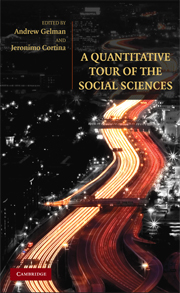Book contents
- Frontmatter
- Contents
- Preface: Learning to Think Like a Social Scientist
- About the Contributors
- PART I MODELS AND METHODS IN THE SOCIAL SCIENCES
- PART II HISTORY
- PART III ECONOMICS
- PART IV SOCIOLOGY
- PART V POLITICAL SCIENCE
- PART VI PSYCHOLOGY
- PART VII TO TREAT OR NOT TO TREAT: CAUSAL INFERENCE IN THE SOCIAL SCIENCES
- 21 The Potential-Outcomes Model of Causation
- 22 Some Statistical Tools for Causal Inference with Observational Data
- 23 Migration and Solidarity
- References
- Index
23 - Migration and Solidarity
Published online by Cambridge University Press: 05 June 2012
- Frontmatter
- Contents
- Preface: Learning to Think Like a Social Scientist
- About the Contributors
- PART I MODELS AND METHODS IN THE SOCIAL SCIENCES
- PART II HISTORY
- PART III ECONOMICS
- PART IV SOCIOLOGY
- PART V POLITICAL SCIENCE
- PART VI PSYCHOLOGY
- PART VII TO TREAT OR NOT TO TREAT: CAUSAL INFERENCE IN THE SOCIAL SCIENCES
- 21 The Potential-Outcomes Model of Causation
- 22 Some Statistical Tools for Causal Inference with Observational Data
- 23 Migration and Solidarity
- References
- Index
Summary
My work on migration, and specifically the field visits that I have done in migrant-sending countries, left me with questions about how migration may reshape prevailing social structures in those communities. One of the aspects that interested me most was how the support from or solidarity of the community with migrant households changed relative to nonmigrant households. In other words, I was interested in investigating if migrant-sending households, especially those with male migrants, received more nonmonetary help (food, clothing, or help with daily activities) from people who lived in the same or a nearby community compared to nonmigrant households in the same community. So, using data from Mexico's Oportunidades, a conditional cash transfer program of the federal government that covers more than 2 million rural families in more than 2,000 municipalities (approximately 80% of Mexico's municipalities), I decided to investigate further the impact of international migration on solidarity from non-household members to migrant and nonmigrant families who live in the same community or in nearby communities.
In order to isolate the effects of local solidarity, I did not take into account the help or solidarity that households might receive from their relatives or friends in foreign countries or from family members who live in another state since this could distort the effect of migration on local solidarity.
The literature on the impact of migration on those left behind is rich; for example, Alejandro Portes (1997, 1998), Peggy Levitt (2001), and others have found that the impact of migration is both positive and negative, depending on the characteristics of the community in which migration takes place.
- Type
- Chapter
- Information
- A Quantitative Tour of the Social Sciences , pp. 319 - 326Publisher: Cambridge University PressPrint publication year: 2009



